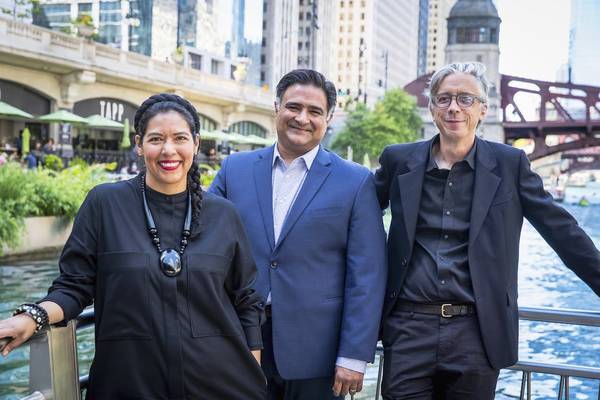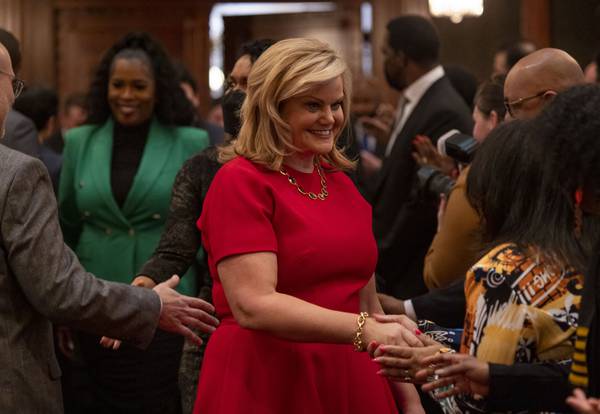[ad_1]
The fall schedule for the 2023 Chicago Humanities Festival is here, but before you bust your eyes out to check out the ambitious spread of 50-plus events spread over two months (September 17 – November 15) Millie Bobby Brown (September 17) or plan your autumn weekends according to the relentless ignorance of our politicians (Andy Borowitz18 October) and the history of sketch comedy (Keegan-Michael Key and his wife Manual Key5 October), consider the stress of putting together a festival like this:
There is this artist requirements 30 minutes of complete silence before going on stage. Coastal agencies that do not view Chicago as a “viable market” for their clients. A nationally renowned academic who didn’t see the point in adding a Chicago academic to a panel discussion. There are viewers who don’t dare go north of Madison. Or head south on Roosevelt. You’re a Midwestern organization with an annual budget of about $4 million, but you’re still a nonprofit, and some of the big names you want to book insist on quite a bit of entourage. Also, the actors who are currently on strike will not argue on stage, you know. things we know them. Should you be worried about the Trump-centered comedian? Sarah Cooper (October 14) Scheduled very closely to Fox News’ Bret Baier (October 14)? Will they meet each other? You want a smart festival that tackles the social issues of the day – this year the rise of artificial intelligence and the impact of climate change – but you may need to put down the Fonz (Henry WinklerNov. 4) to help fund a panel on the connections between Chicago public art and environmental justice (October 14).
Ah, the agitations.
Did you find planning a dinner party difficult?
Try making a plan that lasts 60 days and includes Sonic Youth’s noise monger Thurston Moore (November 1) and provocative essayist Roxanne Gay (November 5) with many older participants. The Chicago Humanities Festival was originally a one-day fall event. It is now in its 34th year and, at its most popular, once offered around 130 events per year. These days the festival takes place all year round and hosts around 100 events. Like other cultural institutions, it is smaller. Executive director Phillip Bahar said attendance was about 50,000, closer to the 2019 post-COVID figure. However, like other cultural groups affiliated with constituencies, membership (basic financial support) has fallen. Bahar expects membership to be 35% lower than the 2,500 members pre-COVID.
The good news is that audiences are younger than they were a decade ago, when the festival’s membership rolls, like those of other Chicago theater companies and musical arts organizations, seemed overwhelmingly gray.

If Lauren Pacheco gets her way, this change will continue.
“If we feel different this year, if we look noticeably different, it’s because we’re moving in a different direction,” Pacheco said. now in its second year As co-creative director with Michael Green. “Michael and I have a vision and we’re still trying to get to know each other and find our fits, and like other cultural organizations we recognize the need to build a younger and more diverse audience and at the same time cover relevant topics. What does this mean in the long run? I think that’s It means we’ll be a little playful – experimental”
And more Chicago, for lack of a better word.

This year’s festival is similar to past festivals in terms of diversity. You get A-list cultural voices: Bob Odenkirk and daughter Erin they are discussing their new book (October 14); a tribute Philip Glass (November 5); writer Zadie Smith (September 19); poet Tracy K. Smith (November 5). And a handful of A-list political figures: Rachel Maddow (October 19), former Illinois congressman Adam Kinzinger interviewed by journalist (and Chicago native) Jonathan Alter (Nov. 5). Numerous national thought leaders: Matthew Desmond on poverty (October 14); Walter Isaacson About Elon Musk (October 14); Naomi Klein in our online mirror room (September 19); David Brooks on the importance of being seen (November 5). And a left-field surprise or two: Controversial Harvard physicist Avi Loeb on the existence of aliens (November 5); First Lady of Illinois M.K. Pritzker Regarding the renovation of the Governor’s Mansion (October 14).
There are in-depth conversations on artificial intelligence: Artificial intelligence and creativity (October 18), Artificial intelligence and criminal justice (November 5). And climate change — Climate change and morality (October 21), Climate change and Chicago (November 5).
But then, there is Sebastian Hidalgo (October 18), a native Pilsen photographer who made a name for himself depicting the effects of gentrification; chicago chef Rick Bayless (with San Francisco chef Anna Voloshyna) on Ukrainian food (October 14); Chicago fashion designer Chelsea Carter (October 18); South Side police shootings and the making of the film used police body camera images (November 5).
“We want to bring together the best scholars from around the country, but we are also in this amazing city and we need to figure out how to better take advantage of what it has to offer,” Pacheco said.
Co-creative director Green said one way to do this is to place more emphasis on live performance and experiential events (based in Chicago, for example). Fulcrum Point New Music Project Minimalist composer performs Le Monte Young (November 16). “For example, along with the Philip Glass event, you also get a sort of mini-series with informal learning on minimalism.”
About a year and a half ago, Green and Pacheco replaced Alison Cuddy as creative director. Green was a public events programmer at the Museum of Contemporary Art and a senior in the education department at the Art Institute of Chicago; Pacheco was a longtime arts administrator and grassroots organizer at Indiana University and the University of Chicago, among other places.
A few autumns later, the Humanities Festival will still be held in the usual places like the Loop, Hyde Park, Evanston. But Green and Pacheco plan to expand this routinely to many more locations around town. Last spring, for example, they programmed a day of events at the Epiphany Center for the Arts on the West Side that included renowned authors Brandon Taylor and Aleksandar Hemon. Citing census data and Chicago’s Latino population growth, Pacheco is now monitoring events on the Far Southwest Side as well as “non-traditional venues” around Little Village and outdoors. His dream, he said, would be a Humanities Festival in the Guaranteed Rate Area that would appeal to a broader audience. “Someday, if we keep up the excitement, hopefully you’ll see a few short riders show up to something at the Chicago Humanities Festival.”
The Chicago Humanities Festival’s Fall Festival will be held at various venues from September 17 to November 15; For the program and more information: www.chicagohumanities.org
cborrelli@chicagotribune.com
 Best American Comics News bestamericancomics.com started its broadcasting life on December 21, 2022 and aims to offer original content to users. Aiming to share information in technology, science, education and other fields, bestamericancomics.com aims to provide its readers with the most up-to-date and comprehensive. Since the content of the site is created by expert writers, readers are reliable and accurate referrers.
Best American Comics News bestamericancomics.com started its broadcasting life on December 21, 2022 and aims to offer original content to users. Aiming to share information in technology, science, education and other fields, bestamericancomics.com aims to provide its readers with the most up-to-date and comprehensive. Since the content of the site is created by expert writers, readers are reliable and accurate referrers.


